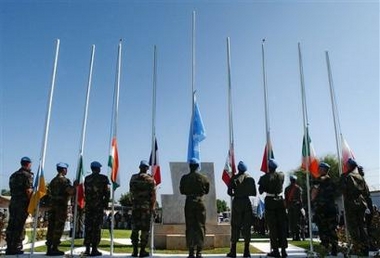 BEIRUT, 22 September (IRIN) – Lebanon needs to review its domestic laws and policies to conform to international norms in order to combat widespread trafficking in human beings, especially women and children, a United Nations expert said."Lebanon’s victims of trafficking are often invisible because they suffer in places that remain hidden to the public eye such as private homes or hotel rooms," Sigmu Huda, the UN Special Rapporteur on human trafficking told reporters following a fact-finding mission that lasted from 8-15 September.
BEIRUT, 22 September (IRIN) – Lebanon needs to review its domestic laws and policies to conform to international norms in order to combat widespread trafficking in human beings, especially women and children, a United Nations expert said."Lebanon’s victims of trafficking are often invisible because they suffer in places that remain hidden to the public eye such as private homes or hotel rooms," Sigmu Huda, the UN Special Rapporteur on human trafficking told reporters following a fact-finding mission that lasted from 8-15 September.
Another project started in July by the Ministries of Justice and Interior with technical cooperation from the UN Office on Drugs and Crime and the UN Children’s Fund, is in the process of assessing the trafficking situation. While no official statistics on the crime exist, experts say thousands of people have been smuggled into Lebanon. Women and children, who often end up as domestic labourers and prostitutes, are particularly prone to abuse. "One survey brought to my attention found that at least one out of every three Lebanese employers beats his or her domestic worker," Huda told reporters in the capital, Beirut, on Friday. "Some victims personally related incidents of traumatic sexual abuse to me." Some of the abused workers had arrived in Lebanon from Asia or Africa to find they were bound by a contract with a local employment agency written in Arabic, a language they did not understand, and completely different than the one they signed in their home country. "It is this second contract that is considered valid and binding by the Lebanese authorities," said Huda, who met government officials, diplomats, NGO leaders and visited correction facilities and safe houses for abused workers. The rights of domestic workers, she added, were practically nonexistent in the Lebanon since they remain excluded from labour protection laws such as the 1946 Labour Code. They also do not have access to labour courts. Apart from physical, sexual and psychological abuse, most of the labourers had to endure 16 hour work days, seven days a week. Sometimes, their wages were withheld. According to UN estimates, between 150,000 and 200,000 domestic workers in Lebanon, mostly from Asia and Africa, have suffered because their employers refused to renew their work permits. Also falling victim to trafficking are Eastern European women who signed contracts to work as dancers in adult clubs or "artistes", only to find themselves coerced into work as prostitutes. "Their vulnerability is exacerbated by the fact that the Lebanese Penal Code criminalises prostitution. A woman engaging in acts of prostitution may be subject to prosecution, detention and deportation," Huda said. "At the same time, the people who operate the nightclubs, to which the women are brought to find their clients, are operating legally according to administrative rules set by [the authorities]," she added. INSUFFICIENT LAWS The Lebanese Parliament ratified in August the UN Protocol to Prevent, Suppress, and Punish Trafficking but it has yet to introduce new laws or amendments that would clamp down on the crime. According to the US State Department’s 2004 report on human trafficking, Lebanese law does not specifically prohibit trafficking in persons. "The Lebanese Penal Code stipulates that, ‘any person who deprives another of freedom either by abduction or any other means shall be sentenced to temporary hard labour’; however, during the year the government did not apply this code to trafficking cases," the report noted. Some of the women who were trafficked, the report added, came to Lebanon voluntarily with legitimate work permits, and an unknown number also entered the country illegally. However, many of those with work permits ended up working illegally in the sex industry. According to the UN Office on Drugs and Crime, trafficking in human beings has reached epidemic proportions across the world in the past decade. It is fuelled by economic disparity, high unemployment and the disruption of traditional livelihoods; and traffickers face few risks and can earn huge profits.



